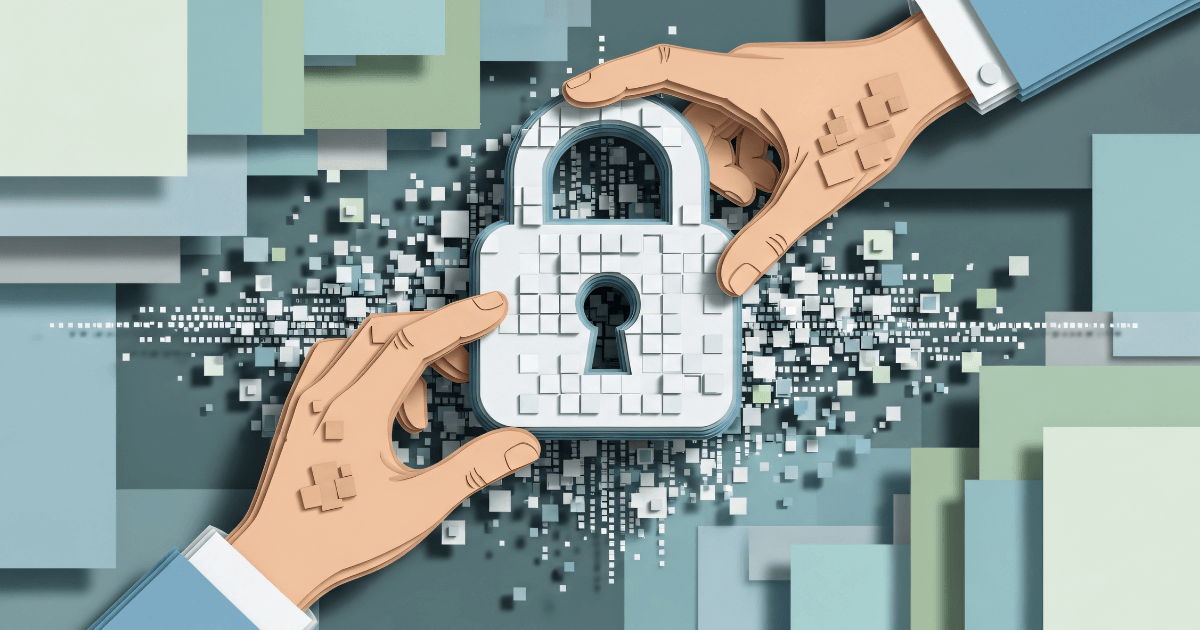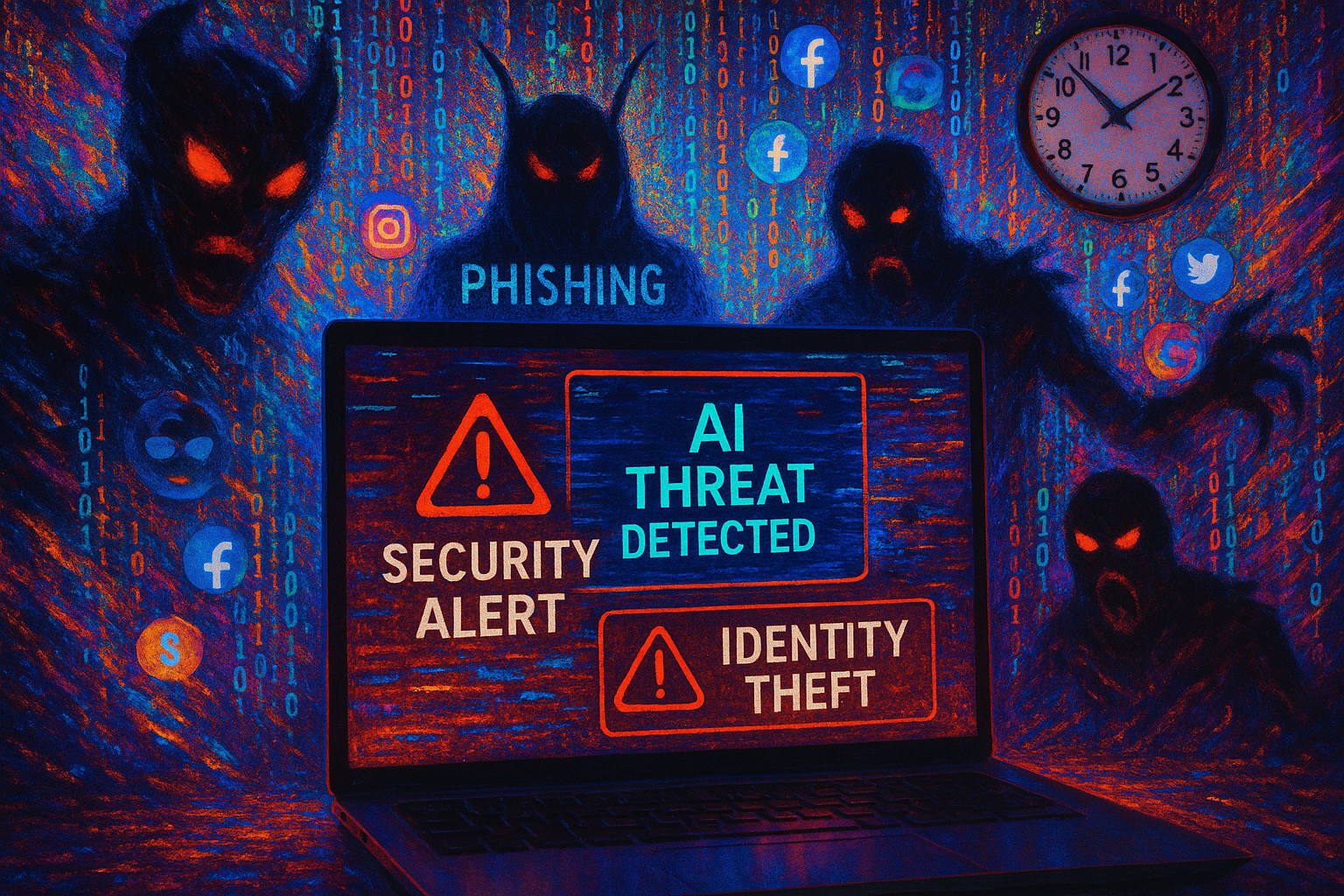5 min read
Meeting the New, AI-Enabled Face of Risk
When we introduced our OmniNet Bridge solution in 2014—known to many of you as My Digital Shield—it represented the next generation of network...

History will eventually view the dawn of the Digital Age as an inflection point that redefined humanity. And like in times past, change and adaptation to the new era will test everything society has learned or experienced before. In the U.S., a crippling flaw lies at the heart of our ability to meet the evolutionary challenges that lie ahead. The weakness is our individual and collective Achille's heel, and it's leaving many unprepared to compete and survive during the revolution of digital-driven change.
In the historical sense, an "Age" marks a period distinctly different from any time in the past. The transition from old to new includes a scope, scale, and rate of change that provokes evolutionary progress across society.
During the first innings of a new age, humankind is unprepared because education and experience don't apply to the rules of the next era. Consequently, matters of survival shift from known to unknown testing human adaptability skills, and ultimately future generations of haves and have-nots are defined.
Looking to history's scribes for insight into past era-defining transitionary periods, I find the below from Will and Ariel Durant in their voluminous books; the Story of Civilization.
The Durants say the experiences were:Individuals and society found:"... baffling instinct."
"... situations so novel that native reactions instinctive and immediate broke down in utter failure."
And they concluded:
Survivors of evolution's test, according to the Durants, were those that:"The failure of plasticity dooms."
"... derived new instruments of intelligence, ... and became new lords of the Earth."
Finally, the period of great change typically climaxes with a period of "revolution" - a series of social wars seeking equilibrium between the newly divided haves and have-nots. Think of World War I and II for the Industrial Age.
The damage and destruction that accompanies the adjustment period thins the unadaptable, fertilizes evolutionary adjustment, and eventually sprouts hearty growth for humanity's next stage of evolvement.
Eventually, the divider between humanity's next generations of haves and have-nots is defined by self-initiative and drive for new wisdom and sensibilities, and with "new instruments of intelligence" to guide successful thought and decision making in the future.
The transition to the digital era will cause disruption and aftermath exponentially more significant than the Industrial Revolution. Evolutionary adjustments will redefine borders, laws, economies, militaries, and the totality of society today. Economic and quality of life damages will be shared generously - individually and collectively. We should prepare for a long season of bubbling chaos and social disruption ahead, before reaching a tipping point of revolutionary correction and a tilt toward equilibrium once again.
Survival and success in the new Digital Age require modern sensibilities, many not yet taught at home or in school. And in most cases, business and government are painfully behind nurturing culture-wide adaptation. For many organizations, "change management" still resides in the soft categories of HR.
The existential challenge of our day is meeting the rapidly increasing demands of cyber-related complexities and risks. Everyday life in the Digital Age requires new critical thinking skills to wisely discern, decide, and find one's way to the right side of evolution's emerging divide.
In the Stone Age, humans that decided to focus on learning new skills with rocks won. But, this new era of change is fundamentally different from those of the past.

It is one thing for humans to objectively manipulate rocks or bronze, or a factory. Even the single atom is more constrained by Newtonian physics than an electron. Mastery of new skills over stuff was kept in check by "natural" characteristics - size, quantity, weight, accessibility, malleability - physical attributes that determined limits and controls.
Weaponizing data is more effective and potentially damaging compared to the stuff of past ages because the distinct nature of digital allows an objective process to grow and scale at "un-natural" rates - paces of change not experienced by humans before.
We are in the early period of re-defining survival and success for the Digital Age. Rules are still being written for a new field of competition - the access, control, and management of information - and for some, the easy money is at hand.
Consequently, digital physics and exponential math is driving profound change, including what will be a hallmark of the Digital Age's early days - the largest transfer of wealth humanity has known.
Consistent with history, economics will drive civilization's adaptation in the Digital Age. The fundamental element of digital economics is data. Finding ways to exchange data for money is the hyperactivity of our age.
The great divide that feeds the immensely profitable data-to-money exchange in the U.S. is arbitrage of personal information between hundreds of millions of unadapted users, and those early-adopters advancing with data control skills. This ranges from Big Tech and the winners of the stalking-economy, to a hacker on the couch in the Ukraine and every other arbiter of information from around the world.
"Cybercrime damages are expected to rise to $6 trillion annually by 2021. This represents the greatest transfer of economic wealth in history."
Cybersecurity Ventures, read more.
Data is the new oil, they say. See "Are the Russians in Your Router?" for more on that.
Most of the $6 trillion in damages will come from exploits centering on collecting and engineering personal information to manipulate and influence action with a rate of predictability.
The business model is:
horde data + feed data to a digital machine = profit
Legitimacy not required.
Society in the U.S. is woefully unable to think critically about so much of what is going on around them in digital form. Our level of awareness, best-practices and behaviors, ability to discern with probing questions, and make objective decisions about fundamental aspects of a cyber-centric life, make us a target for actors everywhere.
We, in the U.S., are the world's shortest path to the riches of power and wealth in the Digital Age.
Listed below are articles, all from the past few weeks of 2018, that demonstrate in real-time how the lack of critical thinking skills in the U.S. is driving Digital Age aggressors today.
In each case, the exploit centers on collecting and engineering personal information to fuel the digital machine's profit model - manipulate data to influence action with a rate of predictability.
If you're the target and are without the ability to reason and discern, it's hard to stand a chance against weaponized data.
First up, a seminal article by cybersecurity guru Krebs. Brian Krebs is the #1 gumshoe in cybersecurity.

On August 2nd, Krebs reported "The Year Targeted Phishing Went Mainstream." Krebs can connect the dots in cyber like no one else, and this is what he sees:
"It has never been easier for scam artists to launch convincing, targeted phishing and extortion scams that are automated on a global scale.
And given the sheer volume of hacked and stolen personal data now available online, it seems almost certain we will soon witness many variations on these phishing campaigns that leverage customized data elements to enhance their effectiveness."
What does "highly personalized" look like to cyber criminals in Krebs' report? A variant of the email extortion scheme he writes about includes a scam that uses actual passwords of its victims. In another it uses known activity on questionable internet sites.
In this approach, the hacker shows what he has as leverage to convince the victim to pay the extortion's demands. In many cases the victim recognizes a password as one that is used across multiple accounts.
Krebs continues -"There are countless other ways these schemes could become far more personalized and terrifying — all in an automated fashion."
The more matters of privacy are important to you, the more vulnerable you are to digital extortion. Damaging personal consequences fund economic leverage for the hacker.
Up next in our real-time look at Digital Age aggressors, this PSA from the FBI on August 2nd evidences the all-out quest for personal information everywhere.
Security warning: Your hacked devices are being used for cyber crime says FBI
Examples of targeted IoT devices include: routers, wireless radios links, time clocks, audio/video streaming devices, Raspberry Pis, IP cameras, DVRs, satellite antenna equipment, smart garage door openers, and network attached storage devices."
Vulnerable devices like routers and webcams are providing an easy means of cyber criminals conducting attacks - and staying anonymous while doing it.As internet connected things continue to surround every thing we do, the risk and attack surfaces expand exponentially. Information is mined at light-speed rates, fueling nefarious actors and activities with greater efficacy and efficiency driving criminal profit motive higher. Read the PSA by the FBI, here.
Take note, we will see attacks engineered, automated, customized, and optimized to scam you - specifically you.
"Iranian hackers are developing software attacks that render computer systems inoperable until a digital ransom is paid. In some cases, government-backed hackers have used the software, either to cause disruption or obtain digital currency from victims, according to security researchers and government officials"

While the Journal's headline is new, the practice of cybercrime for profit by a desperate government is not.
North Korea understands the fruitless nature of nuclear weapons. ICBMs are being used by NoKo as a bargaining chip that diverts attention from the real agenda. Jong-un knows the smartest, most effective and biggest bang for the buck for their needs is now cyber.
In the Digital Age, cyber is Plan A for criminals, corporations, militaries, governments both rogue and legitimate, and anyone else interested in the fastest way to wealth and power when they are the ones making the rules.
Next, "New Sensibilities for Survival and Success in the Digital Age."
Stay tuned by subscribing here.
Find our Home page, here.
For cybersecurity-related education, speaking, and training, contact us.

5 min read
When we introduced our OmniNet Bridge solution in 2014—known to many of you as My Digital Shield—it represented the next generation of network...

9 min read
Over the past decade writing these letters, I’ve made it my mission to help you navigate the digital age with confidence and resilience. If I have...

4 min read
For generations, family offices and ultra-high net worth families have mastered the art of estate planning — preserving wealth, ensuring succession,...